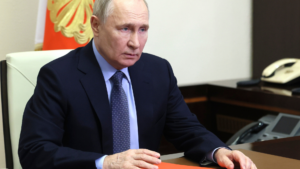On Monday, the Kremlin rejected a report suggesting that Russian military intelligence could be responsible for the enigmatic “Havana syndrome” that has affected U.S. diplomats and spies worldwide.
Insider, an investigative media organization centered on Russia and based in Riga, Latvia, has reported the presence of members from a Russian military intelligence unit, identified as 29155, at locations of reported health incidents affecting U.S. personnel.
The extensive investigation conducted by Insider, in partnership with 60 Minutes and Germany’s Der Spiegel, revealed that high-ranking members of Unit 29155 were recognized with awards and advancements for their involvement in the creation of “non-lethal acoustic weapons.”
“This is not a new topic at all; for many years the topic of the so-called ‘Havana Syndrome’ has been exaggerated in the press, and from the very beginning It was linked to accusations against the Russian side,” stated Kremlin spokesman Dmitry Peskov in response to inquiries about the report.
But no one has ever published or expressed any convincing evidence of these unfounded accusations anywhere,” Peskov said. “Therefore, all this is nothing more than baseless, unfounded accusations by the media.
In Washington, The Pentagon has confirmed that a senior official exhibited symptoms akin to the “Havana syndrome” during the NATO summit in Vilnius the previous year. The ailment has presented symptoms such as migraines, nausea, memory lapses, and dizziness.
Pentagon spokesperson Sabrina Singh stated that the official was not included in U.S. Defense Secretary Lloyd Austin’s delegation and directed inquiries regarding the broader issue to the intelligence community.
The Office of the Director for National Intelligence highlighted the 2024 Annual Threat Assessment, affirming that the U.S. intelligence community remains “closely examining” the so-called Anomalous Health Incidents. However, most agencies concluded that it “is very unlikely a foreign adversary is responsible” for these incidents.
U.S. intelligence agencies assessed that symptoms, first reported by U.S. embassy officials in Havana in 2016, “probably were the result of factors that did not involve a foreign adversary.”
According to The Insider report, the initial incident of “Havana Syndrome” symptoms may have occurred earlier than 2016. The report stated “there were likely attacks two years earlier in Frankfurt, Germany, when a U.S. government employee stationed at the consulate there was knocked unconscious by something akin to a strong energy beam”.
In 2021, the U.S. Congress enacted the Havana Act, authorizing the State Department, CIA, and other government agencies to compensate employees and their families who suffered from health incidents during their assignments.














